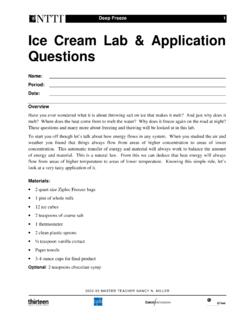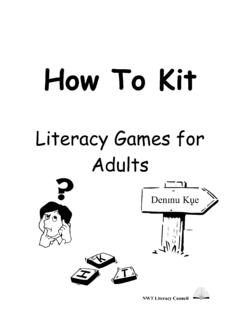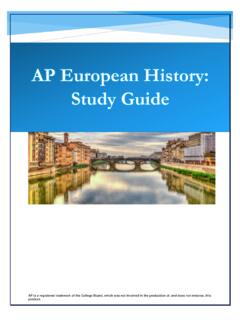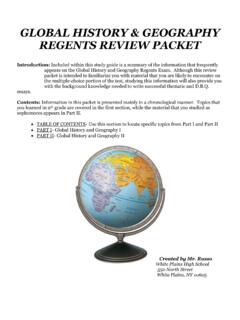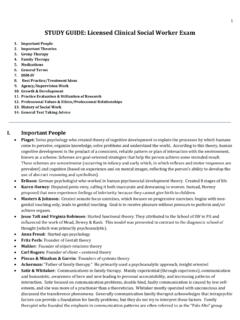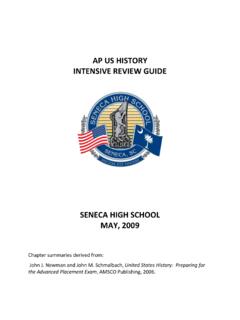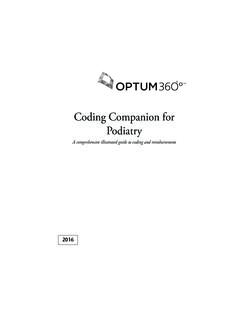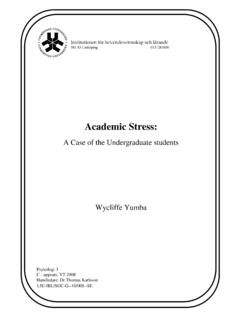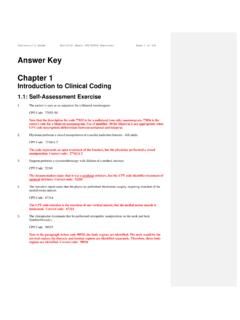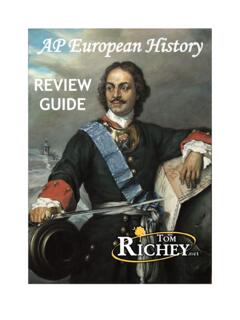Transcription of SCIENCE AND SOCIAL STUDIES - THIRTEEN
1 SCIENCE ANDSOCIAL STUDIESP athways to Passing the GEDGED as ProjectVolume 5 May 2004 Virginia Literacy Institute at Virginia Commonwealth University1015 West Main Box 842020 Richmond, Virginia 23284-2020(800) 237-0178 or (804) 828-6521 by Virginia Department of Education The Virginia Department of Education. The Virginia Department of Education does not unlawfully discriminate on the basis of sex, race, color, religion, disabilities, or national origin in employment or in its educational programs and as ProjectPathways to Passing the GEDV olume 5 : SCIENCE and SOCIAL StudiesGED as Project: Pathways to Passing the GEDwas developed and written by the GED as ProjectTeam and special Team Barbara E. Gibson Principal Investigator Marcia Phillips Project Coordinator Susan Holt Instruction Randall Stamper Editorial Assistant John Vaughan TechnologySpecial Consultants Gene and Mary Boteler, SOCIAL STUDIES teachers in Montgomery County, Maryland, and consultants to the GED Testing Service Diane Foucar-Szocki, Ed D, Associate Professor and Coordinator of the Adult Education/Human Resource DevelopmentUndergraduate and Graduate Degree Program in the College of Education at James Madison University Suzanne Kirk, Liaison for Statewide Initiatives with the SCIENCE Museum of Virginia Eric M.
2 Rhoades, Director of SCIENCE Education at the Virginia Department of Education McCabe/Pillow Graphic Arts Studio DesignAcknowledgements Photo in IA 3-2 reprinted by arrangement with Culver Pictures, 1 Introduction: SOCIAL STUDIES and SCIENCE and the GED 2002 ..1 Section 2 Learning Project: GED SCIENCE and YouInquiry Activity #1: Explore Your Experiences with SCIENCE ..7 Inquiry Activity #2: Developing Your SCIENCE Action Plan ..10 Section 3 Learning Project: GED SOCIAL STUDIES and YouInquiry Activity #1: Explore Your Experiences with SOCIAL STUDIES ..12 Inquiry Activity #2: Developing Your SOCIAL STUDIES Action Plan ..15 Section 4 Creating Your Own Inquiry Activities ..17 Learning Project 1 Understanding Graphs ..20 Inquiry Activity 1-1: Reading Bar Graphs ..21 Inquiry Activity 1-2: Gathering Information from Bar Graphs ..25 Inquiry Activity 1-3: Interpreting Line Graphs ..28 Inquiry Activity 1-4: Recognizing Points on a Time Line.
3 32 Learning Project 2 Reading Charts and Diagrams ..37 Inquiry Activity 2-1: Reading Charts ..38 Inquiry Activity 2-2: Drawing Conclusions from Information on a Chart ..42 Inquiry Activity 2-3: Recognizing the Purpose of Charts ..47 Inquiry Activity 2-4: Answering Questions that Require Content Knowledge ..51 Learning Project 3 Understanding Maps and Pictures ..54 Inquiry Activity 3-1: Reading Maps to Draw Conclusions ..55 Inquiry Activity 3-2: Making Inferences from Pictures ..58 Inquiry Activity 3-3: Analyzing Information from a Map ..61 Inquiry Activity 3-4: Using Text and Pictures ..65 Inquiry Activity 3-5: Drawing Conclusions from Pictures and Passages ..69 Learning Project 4 Reading a Long Passage: SOCIAL STUDIES ..73 Inquiry Activity 4-1: Finding Supporting Details in the Passage ..75 Inquiry Activity 4-2: Bringing Knowledge from Outside the Passage ..78 Inquiry Activity 4-3: Building on the Knowledge ..81 Learning Project 5 Reading a Long Passage: SCIENCE .
4 84 Inquiry Activity 5-1: Recognizing Supporting Details from Your Reading ..86 Inquiry Activity 5-2: Drawing Conclusions ..89 Inquiry Activity 5-3: Reaching a Conclusion ..91 Table of ContentsTable of ContentsivLearning Project 6 Finding Details Supported by the Text ..94 Inquiry Activity 6-1: Finding Supporting Details ..95 Inquiry Activity 6-2: Recognizing Supporting Details ..98 Learning Project 7 Drawing Conclusions from the Text ..101 Inquiry Activity 7-1: Deriving a Conclusion ..102 Inquiry Activity 7-2: Combining Information to Draw Conclusions ..105 Learning Project 8 Using Your Skills to Answer Questions ..110 Inquiry Activity 8-1: Finding the Answers ..111 Inquiry Activity 8-2: Solving the Problems ..114 Learning Project 9 Recognizing Types of Questions ..117 Inquiry Activity 9-1: Identifying the Types of Questions ..118 Inquiry Activity 9-2: Answering Different Types of Questions ..121 Appendix A Helpful Links.
5 126 Appendix B Resources for Learning Projects ..127 Appendix C Concept Maps and Graphic Organizers ..130 Appendix D SOCIAL STUDIES Resources ..132 Appendix E SCIENCE Resources ..142 References ..171vPrefaceThe GED high school equivalency exam has been avail-able to adults for nearly 60 years. Yet, according to the 2000 Census, an estimated 1,000,000 adults in Virginia have nei-ther completed high school nor taken the GED. They are ata disadvantage in our fast-paced, information-driven age,where formal learning and schooling are more important thanever. Helping those adults achieve success on the GEDremains, as it has been for many years, a central tenet of adulteducation in Virginia and across America. The implementa-tion of GED 2002 presents a unique opportunity for adulteducators to help adults achieve their goal of attaining aGED. Now seems an appropriate time to examine currentneeds, practices, and state of the art for preparing adults topass the GED.
6 We must take a fresh look not only at thesubject matter, but also at the way it is have examined the GED: its content, its structure,both old and new, and the skills embedded in the test. Inaddition, we have reviewed many current teaching method-ologies. Our review has led us to propose GED as Project:Pathways to Passing the GEDas a means of achieving effec-tive results with adults pursuing their GEDs. As the nameimplies, the overarching principle of GED as Projectis thevalue of project-based learning in adult education. We pro-pose that the GED test itself can be a powerful project forthose adults who choose to pursue Volume 1: Introduction,we describe our concept of theGED as Project, articulating the role of the instructor, the role ofthe individual (both as test taker and as learner), and the role ofinstructional materials in the classroom. We outline for instruc-tors the necessary practices for using this approach.
7 Central toGED as Projectare the Inquiry Activities, designed to stimulatediscovery by the learner, facilitated by the instructor. Groupedtogether by the theme and/or skills to be explored, InquiryActivities are the basis of Learning Projects. We define LearningProject and Inquiry Activity, provide a template or guide to usein developing Inquiry Activities, and provide sample InquiryActivities for two Learning Projects: GED and You and GED and You Revisited. In addition, we provide an annotat-ed list of references for use with GED Volume 2: Mathematics, we use items from an OfficialGED Practice Test to develop the Inquiry Activities that,grouped together, form the Math Learning Projects. Alsoincluded in this volume is a Learning Project called GEDMath and You, which has been designed as a companion to GED and You in Volume Volume 3, Language Arts, Reading, we again use anOfficial GED Practice Test to develop the Inquiry Activitiesthat form the Language Arts, Reading Learning Projects.
8 GED, Language Arts, Reading and You is included in thisvolume, offering the opportunity to explore this content areaas 4, Language Arts, Writinguses the Official GEDP ractice Test to provide the subject material for essays and todevelop revision techniques necessary for strong performanceon the GED Language Arts, Writing test. The Scoring Guideis included in this volume to inform the learners about howthe essays will be evaluated. GED Language Arts, Writingand You is also included in this 5: SCIENCE and SOCIAL STUDIES completes the two content areas are taken together, since the tech-niques and strategies for dealing with each are the , we use the Official GED Practice Tests to develop theLearning Projects. This volume includes the Learning Projects GED SCIENCE and You and GED SOCIAL STUDIES and You to complete the exploration . Through the learning approach advocated by GED asProject, the adult who seeks help in achieving the GED isregarded in two distinct ways: as a test taker and as a GED as Projectallows instructors to facilitate adults inthe skill of taking tests as well as the skill of learning.
9 Onehelps the adults to pass a credentialing test; the other equipsthem for both life-long learning and competing in today sworld a win/win for all adults pursuing their and SOCIAL StudiesGED as Project: Pathways to Passing the GED has beendeveloped through the hard work, dedication, and vision ofmany adult education professionals. Funded by the Office ofAdult Education and Literacy, Virginia Department ofEducation, the project was begun by Virginia s WorkforceImprovement Network (WIN), a partnership between JamesMadison University and the Virginia Literacy final phase was developed by the Virginia LiteracyInstitute at Virginia Commonwealth first phase of this project included the developmentof the problem-based approach as presented in GED asProject, and the math Learning Projects found in Volume two of the project includes Volumes 3 and 4, LanguageArts, Reading and Writing. The third and final phase presentsScience and SOCIAL STUDIES in Volume 5.
10 Go to the GED asProjectwebsite at: see the mostcurrent information about this project The project team members are as follows: Barbara E. Gibson Principal Investigator Marcia Phillips Project Coordinator Susan Holt Instruction Randall Stamper Editorial Assistant John Vaughan TechnologyWe are deeply appreciative of the consultants who guidedand supported this phase of our work. Their commitment tothe vision of GED as Projectinspired the team to higher levelsthan we had imagined possible. Consultants for this phase ofthe project were: Gene and Mary Boteler, SOCIAL STUDIES teachers inMontgomery County, Maryland, and consultants to theGED Testing Service. Dr. Diane Foucar-Szocki, Associate Professor andCoordinator of the Adult Education/Human ResourceDevelopment Undergraduate and Graduate DegreeProgram in the College of Education at James MadisonUniversity. Suzanne Kirk, Liaison for Statewide Initiatives with theScience Museum of Virginia Eric M.

